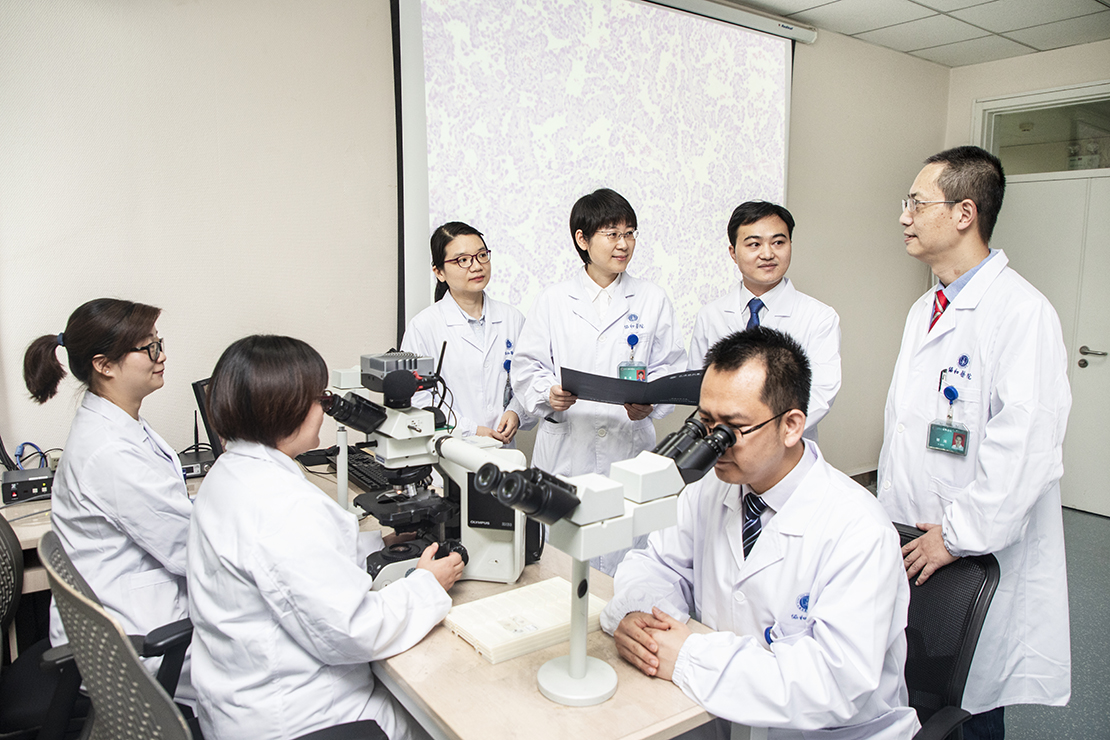Medical Services

Pathology Dept.
Brief introduction
The pathological work in Union Hospital, Tongji Medical College, Huazhong University of Science and Technology had been registered since 1959. In 1988, an independent pathology department was founded to meet greater demand. At the beginning, there were only 2 doctors and 5 technicians. After more than 30 years of development and accumulation, Department of Pathology has 100 staff members, including 55 physicians and physician assistants, and 45 technical and auxiliary personnel. One of faculty members was awarded the "Expert with Outstanding Contribution to Chinese Pathology" and another was awarded the "Outstanding Young Pathologist Award of China". The department integrates medicine, teaching and research as a whole. And it is a national standard training demonstration base for residents, a model laboratory of National Pathology Quality Control Center (PQCC), the first remote pathological consultation pilot center in Hubei Province, and also a demonstration department of the action plan for improving medical service of Health Commission of Hubei Province. In 2019, it was accredited by CNAS medical laboratory ISO15189, and it is the ninth in China and the first department of pathology in Hubei Province.
Department of Pathology offers four clinical services — Autopsy, Cytology, Diagnostic Molecular Pathology, and Surgical Pathology. There are seventeen teams of disease-specific pathologists, including Breast Pathology, Hematopathology, Gynecologic Pathology, Bone and Soft Tissue Pathology, Genitourinary Pathology, Head and Neck Pathology, Gastrointestinal Pathology, Thoracic Pathology, Neuropathology, Dermatopathology, Cardiovascular Pathology, Pediatric Pathology, Endocrine Pathology, Transplantation Pathology, Cytology and Diagnostic Molecular Pathology, etc. There are most-advanced air ventilation and purification system as well as a full set of modern instruments and equipment. A standardized molecular pathology laboratory is fully constructed, which performs dozens of sophisticated molecular tests, using a wide array of technologies such as fluorescence in situ hybridization, real-time fluorescence quantitative PCR, digital PCR, high-throughput next-generation sequencing and Life high-throughput next-generation sequencing. The pathologists use state-of-the-art technology and the most-advanced diagnostic techniques available to analyze thousands of tissue, cytology, and liquid-biopsy samples for precise histologic and cytologic classification. Diagnostic Molecular Pathology focuses on characterizing the genetic changes for the early diagnosis, differential diagnosis, targeted therapy and drug efficacy prediction of genetic diseases, infectious diseases, and tumors. It has always adhered to the concept of taking medical quality as the center idea and implemented the concept of "full participation" in quality control management in daily time. Through ten years of accumulation, it has established a 940,000 words quality management system — "UNION Model", and 255 process are managed by detailed table lists, realizing the informatization, traceability and refinement of the whole management flow. It generates more than 110,000 diagnostic reports, 10,000 out-of-patient consultation reports, 12,000 intraoperative frozen section reports each year.
Since 2015, the department has obtained 8 projects funded by the National Natural Science Foundation of China. And it published 71 SCI papers as the first author or corresponding author in total. Nine of these articles have high-ranking impact factor as high as more than 10, and one was published in the journal Cell.
The department is responsible for pathological theoretical and practice teaching of the medical undergraduate students. It recruits doctoral and postgraduate students, as well as international students, and focus on the post-graduation education and continuing education program. Since 2008, it has hosted provincial and national continuing education programs with the latest development of subspecialties as the theme every year. It has been held for 13 consecutive years, and has played a leading role in the regional demonstration of teaching hospitals. In these years, it has actively expanded foreign cooperation and exchanges, conducted international cooperation and exchanges with famous medical institutions in the world, and established an international remote pathological consultation platform with Johns Hopkins in 2016.




